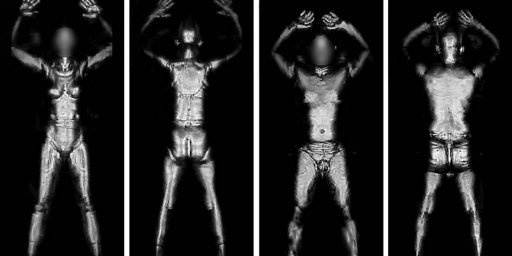CIA Nominee: “Probable Cause” not in 4th Amendment
Via, Radley Balko and Reason Online’s Hit and Run comes this rather disturbing transcript of Lt. General Hayden, Bush’s rumored nominee for the CIA, insists that “probable cause” is not in the Fourth Amendment.
Tim Cavanaugh has a short transcript,
QUESTION: Jonathan Landay with Knight Ridder. I’d like to stay on the same issue, and that had to do with the standard by which you use to target your wiretaps. I’m no lawyer, but my understanding is that the Fourth Amendment of the Constitution specifies that you must have probable cause to be able to do a search that does not violate an American’s right against unlawful searches and seizures. Do you use—
GEN. HAYDEN: No, actually—the Fourth Amendment actually protects all of us against unreasonable search and seizure. That’s what it says.
QUESTION: But the measure is probable cause, I believe.
GEN. HAYDEN: The amendment says unreasonable search and seizure.
QUESTION: But does it not say probable—
GEN. HAYDEN: No. The amendment says unreasonable search and seizure…
GEN. HAYDEN: … Just to be very clear—and believe me, if there’s any amendment to the Constitution that employees of the National Security Agency are familiar with, it’s the Fourth.
Well, the people at the N.S.A. may be most familiar with the Fourth Amendment, but clearly that isn’t saying much.
Here is how the Fourth Amendment reads,
The right of the people to be secure in their persons, houses, papers, and effects, against unreasonable searches and seizures, shall not be violated, and no Warrants shall issue, but upon probable cause, supported by oath or affirmation, and particularly describing the place to be searched, and the persons or things to be seized.–emphasis added
Clearly another fine Bush pick. Now I have to confess I’m coming around to the idea that Bush might just rank as one of the worst President’s of this century. Good gravy.
Update: Commenter Moe Lane has pointed to a full transcript of the comments by Lt. Gen. Hayden and they are included below,
GEN. MICHAEL HAYDEN: Sure. I didn’t craft the authorization. I am responding to a lawful order, alright? The Attorney General has averred to the lawfulness of the order. Just to be very clear, okay — and believe me, if there’s any amendment to the Constitution that employees at the National Security Agency is familiar with, it’s the fourth, alright? And it is a reasonableness standard in the Fourth Amendment. So, what you’ve raised to me — and I’m not a lawyer and don’t want to become one — but what you’ve raised to me is, in terms of quoting the Fourth Amendment, is an issue of the Constitution. The constitutional standard is reasonable. And we believe — I am convinced that we’re lawful because what it is we’re doing is reasonable.
Still this leaves me quite unimpressed. I see no reason to change my view of General Hayden at this point.






Steve, Bush is without a doubt the worst president of this century. And the best. It’s a small field.
Steven, I’m slightly surprised that you didn’t pull a fuller transcript.
Now, this fuller exchange may indeed be an example of a potential CIA Director not knowing anything about the Fourth Amendment; but it can just as easily be seen as an example of one person rather strenuously refusing to accept the core assumptions of another in a debate – and I should note that, indeed, the 4th does not say “illegal”: it says “unreasonable”, and the difference does put a different light on the topic. Given that said light was obscured by the ellipses (read again and you’ll see that they’re arguing over whether to use ‘probable cause’ or ‘unreasonable search and seizure’ as the limiter), I suspect that others might agree with me.
Steven, Steven, Steven. ‘Ware the ellipses. All the good stuff’s in them.
Moe,
The name is Steve, not Steven.
Second, I just read the full transcript and I’m still completely and totally unimpressed. He asserted that the constitutional standard is reasonable, not probable cause. Considering that probable cause very much appears to be the standard I stand by the post.
“The name is Steve, not Steven.”
Noted. No offense was meant; I have a name that gets mangled myself, so I recognize the legitimate irritation involved, and apologize for any distress caused.
“Second, I just read the full transcript …”
Don’t you think that you should started with the full transcript? Because this wasn’t sent out as a “Hayden has a wonky view of the 4th”; this was sent out as “Hayden doesn’t know what the wording of the 4th is”. Given that a reasonably dispassionate look at the full text can argue against the latter (and I think that we can all agree that Jonathan Landay clearly doesn’t have the amendement fully memorized), the too-good-to-be-true nature of the original piece and those guilty-looking ellipses… well, I’m sorry, but getting a full transcript should be SOP.
Nothing personal.
And that’s what I get for too-quick an edit. Remove “Given that”, replace the next comma with a period and stick a “Given” before ‘the too-good-to-be-true’.
Sure, but I couldn’t find it, and I have a fair amount of trust in the guys at Reason.
I disagree. When asked specifically about the wording and “probable cause” Hayden said it was not in there and then went on about reasonableness being the standard in terms of unreasonable searches and seizures. There were no ellipses in that section of the transcript and the one provided by Tim Cavanaugh.
Sure, but I couldnâ??t find it,
I find that text from the speech plus the word transcript works wonders: example. First entry.
and I have a fair amount of trust in the guys at Reason.
…and let that be a lesson for you: trust, but verify. Because I believe that we are now walking back from the proposition that clearly this exchange demonstrates that the only possible explanation is that a potential CIA director has no knowledge of the 4th Amendment.
Look, just admit that there’s a chance that I’m right and I’ll drop the whole thing. 🙂
Collect every candidate and every lawyer you can find and ask them what the 4th Amendment is all about, with all of the nuances and court decisions added. You will not get a full answer from many. Nor is that particularly important. We have books and the internet to freeze the precise language for us. If you want a walking and talking constitutionalist as a candidate for CIA director, good luck to you.
By the way, could you quote the full Amendment before you read up on it just now?
Manning,
And I bet most lawyers would know that the words “probably cause” are in the 4th Amendment. So, thanks for making my point.
As for providing a full quote, that is a bullshit question. No, but I did know about probable cause being in that Amendment. The FISA taps are a little disquieting to say the least. Perhaps they are warranted during war time, but this war has the very real possibility of going on forever.
Moe you are getting really annoying here. I don’t have a problem with Reason’s truncation of the quote. I think it captures the gist of the problem and doesn’t actually counter the view that Hayden was wrong in saying that the 4th Amendment doesn’t include Probable Cause.
And Moe, you are making a strawman argument. Nobody said that the General or NSA doesn’t any knowledge of the 4th Amendment, but that what knowledge they do have is and should be rather disturbing.
I admit that Gen. Hayden may know about the concept of probable cause, just that he doesn’t seem to think much of it.
Great job, Steve. Bush is trying to protect Americans from further terrorist attacks by listening in on conversations Americans are having with known terrorists, and all you can say is that he is the worst president ever.
Gee, I wonder how you would respond if you had to choose between:
a. burning alive in a jet-fuel fire or
b. jumping out of the window 100 stories above the ground.
And Moe, you are making a strawman argument. Nobody said that the General or NSA doesnâ??t any knowledge of the 4th Amendment, but that what knowledge they do have is and should be rather disturbing.
I contend that my summation of your position was essentially accurate, and offer as evidence the language found in both your original post and the one made by Reason. I regret that this annoys you.
And we are probably done here.
Uhhmm, in a word, No. What the NSA wiretapping was doing was listening in on people they thought might be having conversations with terrorists. This means that there were likely people with no connections with terrorists who were being listened too. It is this catagory that is rather disquieting.
No Moe, if your position is that I claimed the General had no knowledge of 4th Amendment then that is wrong. My position is that his knowledge appears to be insufficient.
Steve,
Did you choose a or b?
Maybe we should ask all liberals the question.
“Daddy, I’m scared! Promise me the bad men won’t come back, please, Daddy? Please??”
As I read the exchange, the General was correct.
The initial question was:
“Iâ??m no lawyer, but my understanding is that the Fourth Amendment of the Constitution specifies that you must have probable cause to be able to do a search that does not violate an Americanâ??s right against unlawful searches and seizures.”
The question is incorrect in its premise. The probable cause requirement refers to warrants only. The general protection is found is the first clause of the 4th which says:
“The right of the people to be secure in their persons, houses, papers, and effects, against unreasonable searches and seizures, shall not be violated…”
A warrantless search (which is what the discussion was about) can be valid without probable clause. This is why inventory searches, DUI roadblocks and so-called Terry stops are constitutional.
I have the video on my blog of Hayden trying to correct the reporter on how ‘probable cause’ is not in the Fourth Amendment. It is quite entertaining, albeit scary. We shouldn’t be surprised though. This is the man responsible for running the illegal NSA spy program.
I’m still boggled that we’re being expected to wage a war under the rules of criminal procedure…
Bob’s got it right.
The fourth is divided into a couple of sections where the two statements are concerned. It is a nuanced explanation by the General but it is clearly a correct one.
I see nothing in this nominee to give me pause and I still don’t get the “worst president ever” prattle. Time will tell and prudent men will let time do it’s work as far as this president’s legacy.
I concur with Steven Plunk; Bob is on target with his assessment of the amendment. It is a given that no president will ever nominate a constitutional scholar to the post of Director of the CIA, so I don’t really understand the buzz.
The biggest laugher of the whole nomination of the General is the “Pentagon in charge of the CIA” uproar, even among some Republicans that should know better. We’ve had six previous career military leaders nominated to the position. Each of them has been nominated by a Democrat administration. Could it be that the President was deviating from the previously all civilian nomination pool that the Republicans have historically submitted from in order to “compromise” with the Democrats and smooth the nomination process? Obviously, whatever his motives are, they are way above the heads of Congressmen/women on both sides. At least it kept “Speaker” Pelosi from whining about big oil for a few minutes. I’m thankful to the Almighty for little favors.
“Probable cause” is indeed in there, but does it apply in this instance? More exacting knowledge of the 4th seems to be needed to form a just opinion.
Having met the General on a few occasions (I worked for him–well down the chain of command, when he commanded Air Intelligence Agency), I’ve found a lot of the recent discussion about him pretty amusing. It’s unfortunate that so many tend to project their fears and prejudices into these discussions, as they distract from what could be a very useful discussion.
It matters little whether one hires a Constitutional Scholar as CIA Director. What matters is that the Director is willing to listen to the Office of General Counsel. There are well-defined, long-standing policies on the collection, retention, and use of information about “US Persons”; to those familiar with them, most of the railing in the press and blogosphere about the whole issue says far more about the ignorance of the author than the issue at hand.
Incredible. Is it really so difficult to understand the plain meaning of the following grammatical construction?: ” X shall not be [done]and no Y shall be issued . . . but upon probable cause, supported by oath or affirmation, and particularly describing Z.”
Hayden was wrong. How long O Lord until faith-based ignorance gives way once again to reality?